- Home
- ACADEMIC
- Politics & International Relations
- Politics - Other
- Tampering with Tradition
Tampering with Tradition
The Unrealized Authority of Democratic Agency
Peter Bogason (Anthology Editor) , Sandra Kensen (Anthology Editor) , Hugh T. Miller (Anthology Editor) , Guy B. Adams (Contributor) , Frank Hendriks (Contributor) , Lars Hulgård (Contributor) , Gary Marshall (Contributor) , Juliet Musso (Contributor) , Connie P. Ozawa (Contributor) , James K. Scott (Contributor) , Karina Sehested (Contributor) , Eva Sørensen (Contributor) , Pieter W. Tops (Contributor) , Barton Wechsler (Contributor)
Tampering with Tradition
The Unrealized Authority of Democratic Agency
Peter Bogason (Anthology Editor) , Sandra Kensen (Anthology Editor) , Hugh T. Miller (Anthology Editor) , Guy B. Adams (Contributor) , Frank Hendriks (Contributor) , Lars Hulgård (Contributor) , Gary Marshall (Contributor) , Juliet Musso (Contributor) , Connie P. Ozawa (Contributor) , James K. Scott (Contributor) , Karina Sehested (Contributor) , Eva Sørensen (Contributor) , Pieter W. Tops (Contributor) , Barton Wechsler (Contributor)
This product is usually dispatched within 1 week
- Delivery and returns info
-
Free CA delivery on orders $40 or over
You must sign in to add this item to your wishlist. Please sign in or create an account
Description
Scholars of politics are comfortable theorizing about the parliamentary process and individual political parties, but they are often guilty of ignoring the role of individual citizens except through opinion polls and voting statistics. Even at the local level, the main focus of political theorists has traditionally been on formal systems of government-usually lauding representative democracy as the standard for Western government-while the importance of participatory action at a local level has been vastly underestimated.
Correcting this imbalance, the renowned political scholars who contribute to this volume outline both the theory and practice of so-called "extra-formal democracy," wherein societal governance is more accurately described as a "network activity" and citizens, politicians, public administrators and other professionals act together on issues or problems that are defined as public. This new and complex form of democracy-explored here in three unique settings: the United States, the Netherlands, and Denmark-is increasingly regarded as an achievable vision for a multi-faceted theory of government.
Table of Contents
2 Deliberative Governance: Renewing Public Service and Public Trust
3 Democratic Governance: Allocative, Integrative, or Deliberative?
4 Making Local Democracy Work: Neighborhood-Oriented Reform in Los Angeles and the Dutch Randstad
5 Democratic Consequences of Urban Governance: What has become of Representative Democracy?
6 Entrepreneurship in Community Development and Local Governance
7 Democratic Governance and the Role of Public Adminstrators
8 Mediated Negotiations, a Deliberative Approach to Democratic Governance: Theoretical Linkages and Practial Examples
9 Interaction Research: Joining Persons, Theories, and Practices
10 Democratic Epistemology
11 Extra-Formal Democracy: A Reflection
Product details
| Published | Oct 21 2004 |
|---|---|
| Format | Hardback |
| Edition | 1st |
| Extent | 230 |
| ISBN | 9780739107485 |
| Imprint | Lexington Books |
| Dimensions | 235 x 166 mm |
| Series | New Directions in Culture and Governance |
| Publisher | Bloomsbury Publishing |
About the contributors
Reviews
-
This book is remarkable both for its sophistication in bridging the gap between cutting edge theory and emerging practices of “extra-formal” democracy, and for the freshness of the ideas that follow from its multi-national perspective. I no sooner finished it than I began sharing its insights with my students.
Frank E. Scott, California State University, Hayward
-
This is a timely book! On the domestic front, reactions to terrorism threaten democracy. Internationally, globalism conflates capitalism with democracy to the benefit of capitalism and to the detriment of democracy. Top-to-bottom approaches to democracy are fatally flawed. Horizontal or bottom-to-top, situational, relational, and pragmatic alternatives need to be revived. Together, the authors in Tampering with Tradition provide an intellectually sophisticated foundation for that revival.
Larry S. Luton, Eastern Washington University



































